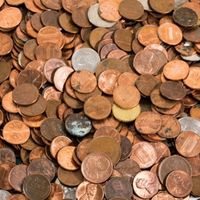How To Clean Corroded Coins. When coins come into touch with chemicals, minerals, or natural elements, they corrode. Corrosion is ugly and can permanently harm or degrade the coin’s surface.
Coin collectors and hobbyists are unable to remove rust off coins using a variety of homemade techniques due to a lack of consensus on their practicality and safety.
For example, there’s a lot of debate among experts over whether metal polishes will work on coins that have already been tarnished by rust.
How To Clean Corroded Coins
We discuss how to clean corroded coins in this article.
Step 1
When it comes to cleaning corroded coins, having clean hands and a clean workspace are essential. Using purified water, gentle soap, soft towels, and plastic containers is a smart method to achieve this.
Step 2
In one of your plastic containers, make some soapy water. Cleaning those plastic containers will just require a modest amount of soap. Mix it up with the distilled water until it’s totally dissolved. Pour some clean distilled water into the second container.
Step 3
Soak the coin in soapy water or rubbing alcohol for a few minutes. Polish lightly with a gentle toothbrush, soft cloth, or your fingers until the picture appears. You may also use lip balm for this method; just be sure to rub off any excess first.
Step 4
In the second container, rinse the clean coin. If you need to use warm water, do so before washing it with clean distilled water. You must thoroughly rinse the cleaned coin in distilled water and ensure that no soap remains on it.
Step 5
A clean piece of towel should be used to dry your money. Wrap the coin in it gently and soak it in warm water for a few minutes. Allow the coin to thoroughly dry before removing the towel.
Avoid stacking coins with other coins since this might cause them to corrode or distort. Pat don’t rub the surface until it’s totally dry.
FAQs
What is the difference between baking soda and vinegar for cleaning coins?
Scrub your soap-washed, vinegar-soaked pennies with baking soda if they still need cleaning.
Baking soda is a soft abrasive that can reach into the smallest nooks and crannies of coins to polish away the final traces of filth and tarnish. To wipe up these dirty corners, use a toothbrush or cotton swab.
What happens to coins if they are exposed to baking soda?
Baking soda’s impact will aid in the removal of the black covering of blackened coins. Physical contact between silver coins and aluminum foil is required.
If you clean the silver with other solvents, it may be harmed. Furthermore, cleaning more valuable coins should be avoided since it might burn away their surface and cause them to lose their natural appearance.
What is the best way to clean coins with Coke?
Fill a glass dish halfway with Coke and place your coins inside. Allow the coins to absorb the fizzy liquid for about 5 minutes before inspecting them for corrosion.
If they’re still filthy, keep them in for an additional 15 minutes. If you wait more than fifteen minutes, you risk losing your pennies.
